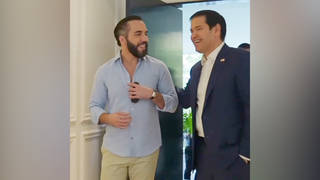
Topics
By Amy Goodman with Denis Moynihan
News broke last week that the U.S. government purposefully exposed hundreds of men in Guatemala to syphilis in ghoulish medical experiments conducted during the late 1940s. As soon as the story got out, President Barack Obama phoned President Alvaro Colom of Guatemala to apologize. Colom called the experiments “an incredible violation of human rights.” Colom also says his government is studying whether it can bring the case to an international court.
The revelations came about through research conducted by Wellesley College medical historian Susan Reverby on the notorious Tuskegee syphilis study. The two former U.S. government research projects, in Tuskegee, Ala., and Guatemala—equally noxious—are mirror images of each other. Both point to the extremes to which ethics can be disregarded in the pursuit of medical knowledge, and serve as essential reminders that medical research needs constant supervision and regulation.
Reverby is the author of the recently published book “Examining Tuskegee,” a comprehensive history of the Tuskegee syphilis study.
Tuskegee, Ala., is in the heart of the Deep South. From 1932 until it was exposed by the press in 1972, the U.S. government conducted a long-term study on the effects of syphilis when left untreated. Four hundred men with syphilis were told that they would be given a “special treatment” for their “bad blood.” Unbeknownst to them, the men were given useless placebos, not the promised cure, and their debilitation caused by the untreated syphilis was tracked over decades. In its advanced stages, syphilis can disfigure and can cause dementia, blindness and extreme, chronic pain. It is a horrible way to die. Ten years into the Tuskegee Study, penicillin was found to cure syphilis. Yet the men were not told about the potential cure and were actively denied treatment when some of them sought it.
In Tuskegee, infected men were left untreated. In Guatemala, the opposite happened.
There, U.S. government researchers actively infected men in prison with syphilis, then treated them with penicillin to measure the antibiotic’s effect immediately after exposure. Syphilis is a sexually transmitted disease, and that is how the lead doctor, Dr. John Cutler of the U.S. Public Health Service, attempted to infect the prisoners. First, they hired prostitutes with syphilis to have sex with the prisoners. When transmission rates were not sufficiently high, the researchers lacerated the men’s penises and applied syphilis-infected cotton to the wounds, or directly injected a fresh “syphilitic mixture” into their spines.
Similar procedures were used on mental patients and soldiers.
Ironically, the Guatemala study began in 1946, the same year as the Nuremberg tribunals, the first of which tried Nazi doctors accused of conducting heinous experiments on concentration-camp prisoners. Half of those accused were put to death. The tribunals produced the Nuremberg Code, which set ethical standards for human medical experimentation and informed consent. Yet Nuremberg didn’t seem to bother the U.S. researchers.
Dr. Cutler, the head of the Guatemala project, later joined the Tuskegee Study. He said in a 1993 PBS “NOVA” documentary, “It was important that they were supposedly untreated, and it would be undesirable to go ahead and use large amounts of penicillin to treat the disease, because you’d interfere with the study.”
The U.S. government has frequently conducted experiments without the informed consent of the subjects. Women in Puerto Rico were given estrogen, at dangerous levels, when testing birth control pills.
Researchers injected unwitting hospital patients with plutonium to study its effects on the human body. Dow Chemical, Johnson & Johnson and Pennsylvania prison authorities exposed inmates to chemicals, including dioxin, to test their effects. Subjects of a number of these experiments and others have died or had their lives indelibly harmed, all in the name of progress or profit.
Researchers are quick to point out that such practices are a thing of the past and have led to strict guidelines ensuring informed consent of subjects. Yet efforts are being made to loosen restrictions on medical experimentation in prisons. We need to ask what “informed consent” means inside a prison, or in a poor community when money is used as an incentive to “volunteer” for research. Medical research should only happen with humane standards, informed consent and independent oversight, if the lessons of Nuremberg, Tuskegee and, now, Guatemala are to have meaning.
Amy Goodman is the host of “Democracy Now!,” an independent, daily global TV/radio news hour airing on more than 950 stations in the United States and around the world. She is the author of “Breaking the Sound Barrier,” recently released in paperback and now a New York Times best-seller.
© 2011 Amy Goodman











Media Options